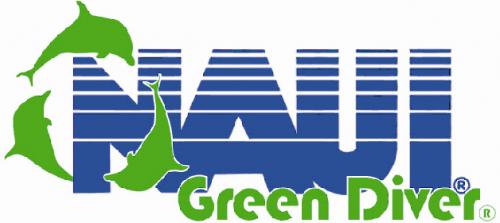BE A
GREEN
DIVER
Underwater Oahu is at the forefront of the worldwide ocean conservation battle. As a member of NAUI Green Diver Initiative, we are continually educating divers and non-divers alike about the underwater world and the need to protect it. The average person isn’t aware that the majority of the earth’s oxygen comes from the ocean (which covers approximately three-quarters of the earth’s surface) produced by tiny ocean plants called “phytoplankton”. Phytoplankton live very close to the ocean’s surface, drifting with the currents. Like all plants, they photosynthesize – that is, they use sunlight and carbon dioxide to make food. A byproduct of photosynthesis is oxygen.

Scientists believe that phytoplankton contribute between 50 to 85 percent of the oxygen in Earth’s atmosphere. So if we harm the oceans, we are literally harming our main source of oxygen.
What Can We Do?
Aside from picking up trash on the beaches or underwater, we can all do our part by examining the things we are doing above the water to help conserve our most precious resource. Here are some suggestions:
Reduce Plastic Use
Make the Switch to Sustainable Alternatives.
Try to reduce your use of anything plastic, especially plastic water bottles. If we create the demand by purchasing plastic products, we are contributing to the problem in a big way. Depending on the size of the item, plastic takes hundreds of years or more to biodegrade. And we’re not even sure that plastic ever really goes away. Scientists have found small particles of plastics ingested by fish which does not bode well for the oceans if we don’t do something to stop the pollution.
Use paper products instead – they are natural and can biodegrade in a matter of weeks to months. For utensils, use metal. They’re re-usable and will last a long long time. Use metal water containers – these can be refilled with filtered water.
Protect the Ocean
Say No to Harmful Chemicals and Waste Dumping.
Don’t dump harmful liquids (gasoline, oil, pesticides, etc.) into gutters and storm drains. These drain directly to rivers and estuaries and eventually end up in the ocean, which kills the surrounding marine life, such as corals, fish and the phytoplankton.
Use biodegradable products as much as possible. Everything that goes down your shower drain, kitchen sink drain, etc., can end up in the ocean. Hair products, detergents, etc., all contain chemicals created in a laboratory that are harmful to the environment. Choose hair care, body care, sunscreens and detergents that are labeled “environmentally safe” and or “biodegradable”. In short, think about whether what you are putting down the drain will harm the ocean.
Spread the Word
Taking Action to Protect Our Environment.
Tell your friends and family! Continue the education process by helping them understand how important this issue is to all of us. It literally means the long-term survival of life on our planet.
We all need to do as much as we can to protect our environment we live in. Even if we can’t completely eliminate the use of plastics, drastically reducing our use of them and other harmful products will have a positive impact on the environment by reducing the toxic waste from the manufacturing process, which affects air and water quality, and by reducing the amount of solid waste that pollute the air, land and oceans.

